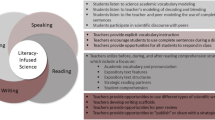Abstract
This commentary situates, summarizes, and critiques the global attempts, as documented in this book, to address the complex language/literacy-science education problem space involving curriculum, integrated learning, classroom practices, challenges, instruction embedded in an inquiry-oriented context, and teacher education and development issues focused on the fundamental sense of science literacy. Few science education policies or curriculum documents recognize a contemporary view of learning science or specify that language is a critical component of science literacy and that instructional attention must be afforded science language, scientific metalanguage, and other fundamental abilities and strategies as part of inquiry-oriented programs. Many countries rely on the language arts or literacy curricula to justify disciplinary literacy in science education. The infusion of literacy goals into science programs requires the reallocation of effort and time, which many educators and teachers will view as impeding the content objectives emphasized in most science curricula, teaching, and assessment. This infusion will necessitate the development of a robust operational definition of science literacy amongst the language/literacy and science education communities that respects the epistemic and ontological nature of science, the development, verification, and implementation of innovative science literacy opportunities in argument-based, multiple information resources and technology-rich science instruction, and new professional learning approaches for language and science teachers in primary, middle, secondary, and postsecondary institutions. Furthermore, the language/literacy and science education research communities may wish to consider secondary analyses of existing research results in order to set the agenda and designs for future research.
Similar content being viewed by others
References
Jagger, S., & Yore, L. D. (2012). Mind the gap: Looking for evidence-based practice in science literacy for all in science teaching journals. Journal of Science Teacher Education, 23(6), 559–577.
Minner, D. D., Levy, A. J., & Century, J. (2010). Inquiry-base science instruction—what is it and does it matter? Results from a research synthesis years 1984 to 2002. Journal of Research in Science Teaching, 47(4), 474–496.
National Research Council. (2012). A framework for K-12 science education: Practices, crosscutting concepts, and core ideas. Washington: National Academy of Sciences.
National Research Council. (2016). Science literacy: Concepts, contexts, and consequences. Washington: National Academy of Sciences.
Rossman, G. B., & Yore, L. D. (2009). Stitching the pieces together to reveal the generalized patterns: Systematic research reviews, secondary reanalyses, case-to-case comparison, and metasyntheses of qualitative research studies. In M. C. Shelley II, L. D. Yore, & B. Hand (Eds.), Quality research in literacy and science education: International perspectives and gold standards (pp. 575–601). Dordrecht: Springer.
Shanahan, T., & Shanahan, C. (2008). Teaching disciplinary literacy to adolescents: Rethinking content-area literacy. Harvard Educational Review, 78(1), 40–59.
Tang, K-S. (2016). Constructing scientific explanations through premise–reasoning–outcome (PRO): An exploratory study to scaffold students in structuring written explanations. International Journal of Science Education, 38(9), 1415–1440. https://doi.org/10.1080/09500693.2016.1192309
Yore, L. D., & Tippett, C. D. (2014). Reading and learning science. In R. Gunstone (Ed.), Encyclopaedia of science education (pp. 821–828). Dordrecht: Springer. https://doi.org/10.1007/978-94-007-6165-0130-2
Author information
Authors and Affiliations
Corresponding author
Editor information
Editors and Affiliations
Rights and permissions
Copyright information
© 2018 Springer International Publishing AG
About this chapter
Cite this chapter
Yore, L. (2018). Commentary on the Expanding Development of Literacy Research in Science Education. In: Tang, KS., Danielsson, K. (eds) Global Developments in Literacy Research for Science Education. Springer, Cham. https://doi.org/10.1007/978-3-319-69197-8_22
Download citation
DOI: https://doi.org/10.1007/978-3-319-69197-8_22
Published:
Publisher Name: Springer, Cham
Print ISBN: 978-3-319-69196-1
Online ISBN: 978-3-319-69197-8
eBook Packages: EducationEducation (R0)




